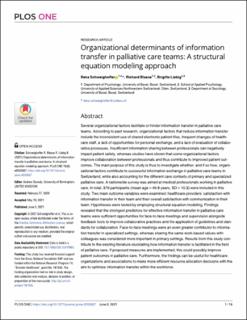Please use this identifier to cite or link to this item:
https://doi.org/10.21256/zhaw-23099Full metadata record
| DC Field | Value | Language |
|---|---|---|
| dc.contributor.author | Schweighoffer, Reka | - |
| dc.contributor.author | Bläse, Richard | - |
| dc.contributor.author | Liebig, Brigitte | - |
| dc.date.accessioned | 2021-09-13T08:20:04Z | - |
| dc.date.available | 2021-09-13T08:20:04Z | - |
| dc.date.issued | 2021 | - |
| dc.identifier.issn | 1932-6203 | de_CH |
| dc.identifier.uri | https://digitalcollection.zhaw.ch/handle/11475/23099 | - |
| dc.description.abstract | Several organizational factors facilitate or hinder information transfer in palliative care teams. According to past research, organizational factors that reduce information transfer include the inconsistent use of shared electronic patient files, frequent changes of healthcare staff, a lack of opportunities for personal exchange, and a lack of evaluation of collaborative processes. Insufficient information sharing between professionals can negatively impact patient safety, whereas studies have shown that some organizational factors improve collaboration between professionals and thus contribute to improved patient outcomes. The main purpose of this study is thus to investigate whether, and if so how, organizational factors contribute to successful information exchange in palliative care teams in Switzerland, while also accounting for the different care contexts of primary and specialized palliative care. A nationwide survey was aimed at medical professionals working in palliative care. In total, 379 participants (mean age = 49.8 years, SD = 10.3) were included in this study. Two main outcome variables were examined: healthcare providers’ satisfaction with information transfer in their team and their overall satisfaction with communication in their team. Hypotheses were tested by employing structural equation modeling. Findings revealed that the strongest predictors for effective information transfer in palliative care teams were sufficient opportunities for face-to-face meetings and supervision alongside feedback tools to improve collaborative practices and the application of guidelines and standards for collaboration. Face-to-face meetings were an even greater contributor to information transfer in specialized settings, whereas sharing the same work-based values with colleagues was considered more important in primary settings. Results from this study contribute to the existing literature elucidating how information transfer is facilitated in the field of palliative care. If proposed measures are implemented, this could possibly improve patient outcomes in palliative care. Furthermore, the findings can be useful for healthcare organizations and associations to make more efficient resource allocation decisions with the aim to optimize information transfer within the workforce. | de_CH |
| dc.language.iso | en | de_CH |
| dc.publisher | Public Library of Science | de_CH |
| dc.relation.ispartof | PLOS ONE | de_CH |
| dc.rights | http://creativecommons.org/licenses/by/4.0/ | de_CH |
| dc.subject | Communication | de_CH |
| dc.subject | Health care provider | de_CH |
| dc.subject | Palliative care | de_CH |
| dc.subject | Primary care | de_CH |
| dc.subject.ddc | 362: Gesundheits- und Sozialdienste | de_CH |
| dc.title | Organizational determinants of information transfer in palliative care teams : a structural equation modeling approach | de_CH |
| dc.type | Beitrag in wissenschaftlicher Zeitschrift | de_CH |
| dcterms.type | Text | de_CH |
| zhaw.departement | School of Management and Law | de_CH |
| zhaw.organisationalunit | Center for Corporate Responsibility (CCR) | de_CH |
| dc.identifier.doi | 10.1371/journal.pone.0252637 | de_CH |
| dc.identifier.doi | 10.21256/zhaw-23099 | - |
| zhaw.funding.eu | No | de_CH |
| zhaw.issue | 6 | de_CH |
| zhaw.originated.zhaw | Yes | de_CH |
| zhaw.pages.start | e0252637 | de_CH |
| zhaw.publication.status | publishedVersion | de_CH |
| zhaw.volume | 16 | de_CH |
| zhaw.publication.review | Peer review (Publikation) | de_CH |
| zhaw.author.additional | No | de_CH |
| zhaw.display.portrait | Yes | de_CH |
| Appears in collections: | Publikationen School of Management and Law | |
Files in This Item:
| File | Description | Size | Format | |
|---|---|---|---|---|
| 2021_Schweighoffer-etal_Organizational-determinants-of-information-transfer.pdf | 966.81 kB | Adobe PDF |  View/Open |
Show simple item record
Schweighoffer, R., Bläse, R., & Liebig, B. (2021). Organizational determinants of information transfer in palliative care teams : a structural equation modeling approach. Plos One, 16(6), e0252637. https://doi.org/10.1371/journal.pone.0252637
Schweighoffer, R., Bläse, R. and Liebig, B. (2021) ‘Organizational determinants of information transfer in palliative care teams : a structural equation modeling approach’, PLOS ONE, 16(6), p. e0252637. Available at: https://doi.org/10.1371/journal.pone.0252637.
R. Schweighoffer, R. Bläse, and B. Liebig, “Organizational determinants of information transfer in palliative care teams : a structural equation modeling approach,” PLOS ONE, vol. 16, no. 6, p. e0252637, 2021, doi: 10.1371/journal.pone.0252637.
SCHWEIGHOFFER, Reka, Richard BLÄSE und Brigitte LIEBIG, 2021. Organizational determinants of information transfer in palliative care teams : a structural equation modeling approach. PLOS ONE. 2021. Bd. 16, Nr. 6, S. e0252637. DOI 10.1371/journal.pone.0252637
Schweighoffer, Reka, Richard Bläse, and Brigitte Liebig. 2021. “Organizational Determinants of Information Transfer in Palliative Care Teams : A Structural Equation Modeling Approach.” Plos One 16 (6): e0252637. https://doi.org/10.1371/journal.pone.0252637.
Schweighoffer, Reka, et al. “Organizational Determinants of Information Transfer in Palliative Care Teams : A Structural Equation Modeling Approach.” Plos One, vol. 16, no. 6, 2021, p. e0252637, https://doi.org/10.1371/journal.pone.0252637.
Items in DSpace are protected by copyright, with all rights reserved, unless otherwise indicated.